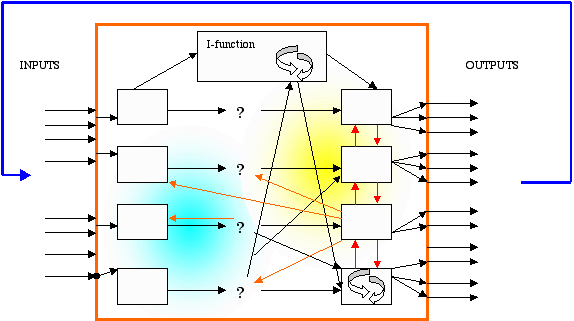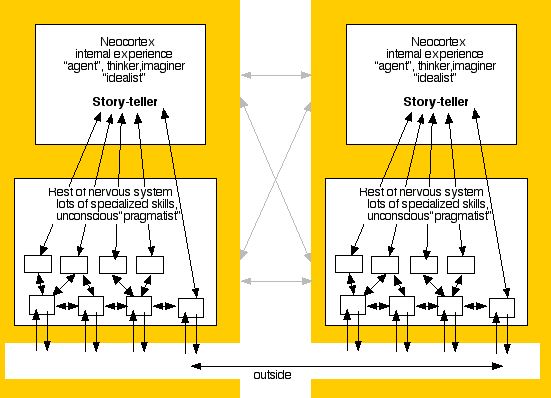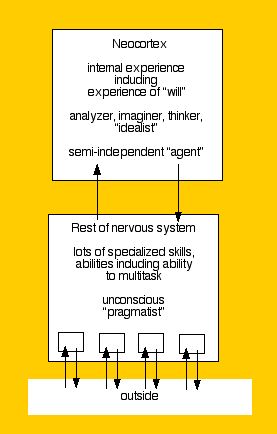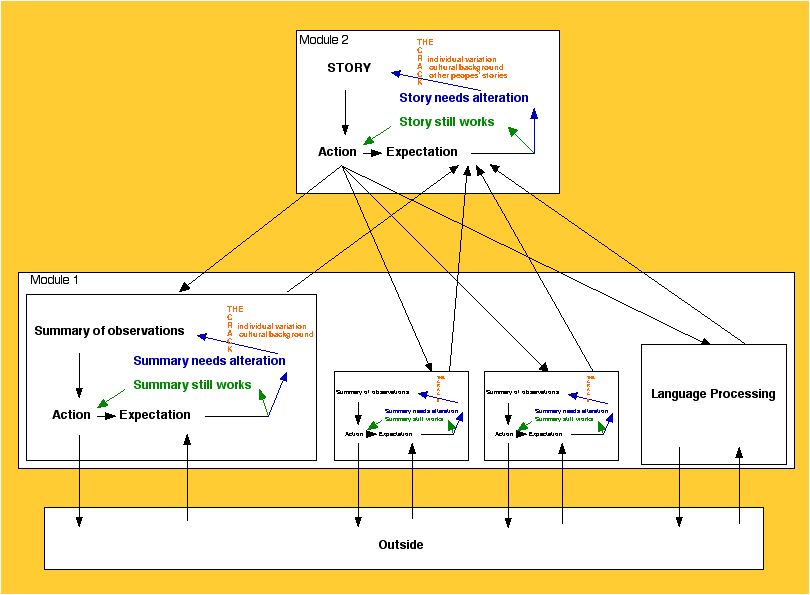Serendip is an independent site partnering with faculty at multiple colleges and universities around the world. Happy exploring!
BBI 2007 Session 17

 |
BRAIN AND BEHAVIOR INSTITUTE 2007 |

|
The Unconscious/I-function/Story Teller, Intuition/Rationality, Learning/Memory,
Human Differences: Their Origins and Significance
The Three Loops
Review: Feelings, intuitions, emotions as general signals from the unconscious"There have been times when I have told my students to put away their problems & concentrate on the classwork. I think that this statement is still ok, but now I will also try to teach them how to use their emotions." ... Diane
"Emotions are a necessary part of our life; we need to learn to control them and not be controlled by them" ... Judith
"Most of the time prior to this I would have asked students to leave their emotions outside the classroom, or control them so they do not interfere. Now I think I will ask about emotions, try to put students in touch with their own and see how emotions may be used to help learning happen" ... Bruce
"Perhaps this teaching about emotions is simply strengthening of the I-fcn in working with the unconscious and its communications" ... Teresa
"when a child comes into to school in a bad mood and we ask them what is wrong, when they don't answer we assume they don't want to share, maybe they really just don't know." ... Dalia
"This idea of "More than one mind" helps me to better understand disorders like depression and schizophrenia. But furthermore, I have really been able to use this information to help students understand them selves. I think it is in all or our better interest to take time to teach part of this institute to our students ... I can speak for my experience that it is truely affective for many of my students. The differences I see in them after giving them a brief explanation of "more than one mind" in their own bodies really has a positive affect ... If you are interested on a simple way that I have found affective to help redirect (not control) negative behaviors, please feel free to ask me about the "SPOT" experiment ... Keith
"What with our brains filling in missing sight information with our imagination and and moods being generated independently of the I-function. it is no wonder human brains need diverse feedback loops functioning constantly on all levels" ... Bob
Some more bipartite issues:
Putting the bipartite brain together (the outside/inside loop and the unconscious/story teller loop) The Bipartite Brain as a Scientist, Explorer


The Bipartite Brain as a Scientist/Explorer/Story Teller/Story Reviser
The value of inside conversations- Personal choice, free will
- I-function tells/retells story of self, as unconscious tells/retells story of world?
- Co-constructing reality and the self
- "I am, and I can think; therefore I can change who I am" (and things around me as well)
The value of conversations with others (adding the third interpersonal loop)

Human diversity as asset rather than problem
- Diversity and Deviance: A Biological Perspective
- Culture as Disability
- Neurotypical Syndrome
- A test case: sex/gender
Science and the brain

Science is not a particular set of understandings but instead is
a particular skill at generating new understandings,
a skill that is inherent in the brain,
one that everyone starts with and can get better at.
True? Good story? Add your thoughts in the on-line forum.





Comments
Memories as Stories Response
The teacher student output-input cycle
When a teacher reacts to a child, the child’s summary of observation changes resulting in changes to the student’s story indicating learning has occurred.
Subsequently the teacher, depending on their summary of observation of the student’s reaction to their output, decides if their prior input to the student elicited the desired student behavior (student output). If the teacher’s summary of observations indicates that the resulting change in the student behavior has achieved the desired effect, the teacher then should reinforce the student’s story with their outputs.
If the teacher’s summary of observations indicates that the resulting change in the student behavior has not achieved the desired effect, the teacher then should generate an output, which will produce the desired student behavior. The teacher’s output will hopefully change the child’s summary of observation resulting in change of their story producing the desired behavior. This cycle continues until the teacher has elicited the desired change to the student’s story, i.e. the desired behavior or output indicating a new learning mode.
The Teacher to Student input-output cycle.
Teacher output, student receives the teacher’s outputs as inputs resulting in a change in their summary of observations resulting in a new story. Teacher continues to monitor this process until the student’s behavior indicates that the student’s story is less wrong.
memories
The rest is still unwritten...(and maybe what came before also)
I understand the argument that our memories are "stories". It makes the most amount of sense when one factors in the third loop- the "interpersonal" loop between the stories my brain might come up with to explain observations versus the stories that someone else's brain might come up with to understand the same observations. Viewed from that perspective, it actually seems the way to get it wrong the least to equate our memories with stories that our brains tell.
On a more personal level, then, I would suggest that our memories are stories that are still being written. Some say that one is not the sum of one's experiences but rather it is what one (the I function?) does with those experiences that makes a person. Again, the theme of "engaging the 'I function'" in a student is repeated...encourage the students to know what they are conscious of and they will learn more...namely, they will be more exacting in the observations they make from their environment and be more conscious in their reactions to and explanations of them.
memories
Three Loops
memories
Memories as Stories Response
I too am a little uncomfortable saying that my memories are not real. However, I see that there are many things that happen which support this notion. There are many useful applications for this in the classroom as well. If you enter a discussion with a student about a certain event, it is helpful to remember that your perception of the event and their's may be very different. If we remain open to understanding that student's memory of the event we can help them open up and see other perspectives. I think this could have great potential for increasing tolerance, compassion, and understanding in the classroom.
my memories, myself
My world has been turned upside down
So let me get this right my
Post new comment